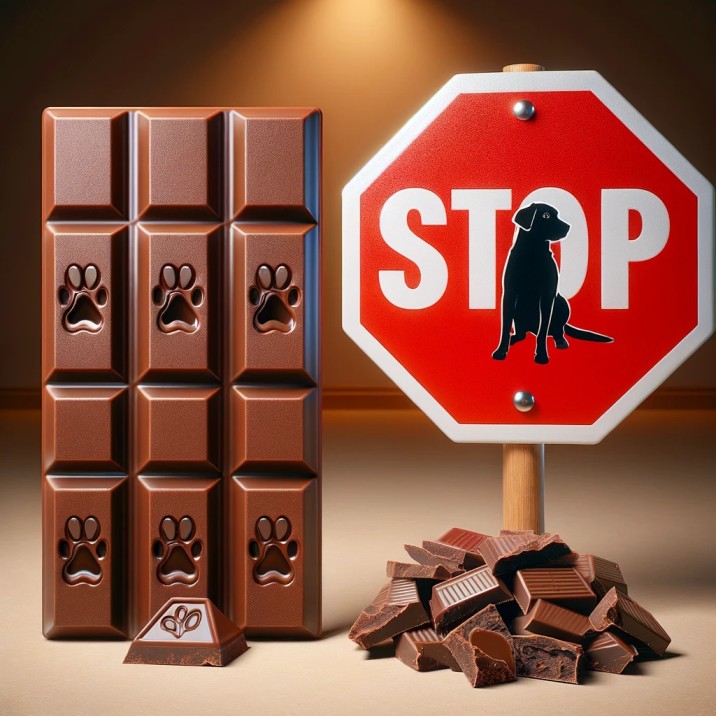Why can’t dogs eat chocolate? Dogs can’t eat chocolate because it contains theobromine and caffeine, substances that are toxic to them. These compounds belong to a class of chemicals known as methylxanthines, which are found in cocoa seeds. While humans can metabolize these chemicals efficiently, dogs process them much more slowly, allowing toxic levels to accumulate in their bodies.
Understanding Theobromine and Caffeine Toxicity
Theobromine and caffeine affect the central nervous system and cardiac muscles. In dogs, these compounds can lead to various health issues ranging from mild to severe. Theobromine, in particular, is more harmful to dogs as they metabolize it much slower than humans.
How Much Chocolate is Toxic to Dogs?
The toxicity of chocolate to dogs depends on the type and amount of chocolate consumed and the dog’s size and overall health. Dark chocolate and baking chocolate contain higher levels of theobromine and caffeine and are therefore more dangerous than milk chocolate or white chocolate.

Symptoms of Chocolate Poisoning in Dogs
The symptoms of chocolate poisoning in dogs can vary but often include:
- Vomiting and diarrhea
- Restlessness and hyperactivity
- Rapid breathing
- Increased heart rate
- Muscle tremors
- Seizures
- In severe cases, death
The onset of these symptoms can occur within hours of ingestion and can last several days.
What To Do If Your Dog Eats Chocolate
If your dog eats chocolate, immediate veterinary attention is crucial. Treatment might include inducing vomiting, administering activated charcoal to prevent further absorption, intravenous fluids, and medications to control symptoms like seizures and heart rate.
The Role of Dog Size and Chocolate Type
Smaller dogs are at a higher risk of chocolate poisoning because it takes a much smaller amount of chocolate to affect them. Similarly, the type of chocolate matters greatly – darker chocolates are more dangerous than lighter ones.
Prevention: Keeping Chocolate Away from Dogs
Prevention is straightforward – keep all chocolate products out of your dog’s reach. Educate all family members, especially children, about the dangers of feeding chocolate to dogs.
Understanding Dog Metabolism and Chocolate
Dogs metabolize theobromine much slower than humans, leading to the buildup of toxic levels in their system. Their digestive system and liver can’t process these compounds efficiently, making chocolate a significant health hazard for them.
Myths About Dogs and Chocolate
There are several myths about dogs and chocolate, such as “a little bit won’t hurt” or “all dogs react the same.” These are dangerous misconceptions. Any amount of chocolate can be harmful, and individual dogs will react differently based on various factors.
Long-Term Effects of Chocolate Consumption in Dogs
In cases of severe chocolate poisoning, there can be long-lasting effects on a dog’s health, including permanent damage to the heart and central nervous system.
How Vets Treat Chocolate Poisoning
Veterinary treatment for chocolate poisoning focuses on immediate stabilization, preventing further absorption of theobromine and caffeine, and managing any cardiovascular or neurological symptoms.
Educating Dog Owners
Educational efforts play a crucial role in preventing chocolate poisoning in dogs. Veterinarians and pet organizations often stress the importance of keeping chocolate away from pets and recognizing the signs of chocolate poisoning.
The Science Behind Chocolate Toxicity
At a deeper scientific level, the toxic effects of chocolate in dogs are linked to the way theobromine and caffeine block adenosine receptors, leading to increased adrenaline and noradrenaline, which can cause the aforementioned symptoms.
Emergency Care for Chocolate Poisoning
In an emergency, understanding the type and amount of chocolate ingested can be vital in determining the course of treatment. Speed is crucial, as early intervention can prevent more severe symptoms.
The Importance of Dog-Specific Diet Awareness
This situation underscores the broader need for awareness about dog-specific dietary requirements and dangers. Dogs have different metabolic pathways compared to humans, making certain human foods toxic to them.
Chocolate Poisoning and Its Frequency
While cases of chocolate poisoning in dogs are relatively common, awareness and prompt veterinary care can often lead to successful outcomes.

